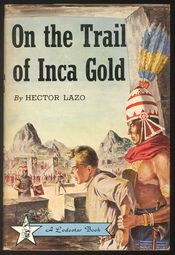 Every American generation has its young adult fiction, and we can all agree it tends to reflect the society of its time. We associate the young adult fiction of the 1950s with books like Tom Swift and Nancy Drew. Such fiction, including this book, On The Trail of Inca Gold, was highly optimistic, techno-utopian in some cases, and grounded in an ethic of individual achievement, human possibility and self-reliance, along with belief in America and a positive attitude toward its government and ruling class. We are always told today how awful the 1950s were, where everyone was crushed by endemic sexism, racism and species-ism, all minutely managed by Joseph McCarthy, who bestrode the country with a lead-loaded bullwhip and unleashed hell on cowering America. The reality was that the 1950s were a period of completely justified, unparalleled optimism and growth in prosperity—and young adult fiction fit the actual national mood.
Every American generation has its young adult fiction, and we can all agree it tends to reflect the society of its time. We associate the young adult fiction of the 1950s with books like Tom Swift and Nancy Drew. Such fiction, including this book, On The Trail of Inca Gold, was highly optimistic, techno-utopian in some cases, and grounded in an ethic of individual achievement, human possibility and self-reliance, along with belief in America and a positive attitude toward its government and ruling class. We are always told today how awful the 1950s were, where everyone was crushed by endemic sexism, racism and species-ism, all minutely managed by Joseph McCarthy, who bestrode the country with a lead-loaded bullwhip and unleashed hell on cowering America. The reality was that the 1950s were a period of completely justified, unparalleled optimism and growth in prosperity—and young adult fiction fit the actual national mood.
I read this book several times as a child, when it was already passé; I must have been ten or so, and I remembered it with positive feelings. I know it was this book I read, but I remembered nothing at all of the story, not even after re-reading it. It’s not a famous book. The story revolves around the hero, Dick Collins (even the name sounds like a throwback), son of the United States Ambassador to Peru, presumably in the mid-1950s—there are no dates given, or dates that would identify a specific year, but the book was published in 1956, and the flavor is exactly of that time. Dick gets lost, falls in with some Indians, has some adventures, and escapes back to civilization.
This isn’t a good book by any objective standard. The writing is tedious, the story predictable, the characters flatly drawn. I remember it as exciting. It’s not. There’s not even any damn gold to be on the trail of, just some derelict descendants of the Incas hiding in the mountains. It’s not even a Dirk Pitt novel. I really didn’t like this book at all.
But that’s not what I care about. Yes, I was hoping to relive my youth, but I can always read my children Tikki Tikki Tembo yet again if I really want to do that. Not to mention that has the benefit of engaging in cultural appropriation, which I do as often as possible. Excuse me while I take off my sombrero and moccasins to get comfortable; walking a mile in another’s moccasins just shows what crappy shoes they are, and how synthetic, petroleum-based materials are awesome.
Ah, that’s better. Actually, I’m just using On the Trail of Inca Gold to make a point and a prediction. I’ve been wondering out loud for at least a year when the vogue for dystopian fiction would end. It reflects peoples’ real fears, and I saw no reason to think that would change. The ever more threatening and coarsening hand of government; the crushing of liberty; economic stagnation for the vast majority of people; and the looming election of the Right Hand of Satan, Hillary Clinton. Who would be optimistic, facing that? Not me, and not writers and readers of young adult fiction.
Nonetheless, while young adult fiction reflects its time, it also reflects fashion, and no fashion lasts forever. And I realized the day after Trump was elected—the fashion ends now. Despite the caterwauling of the Left, amplified by its control of the media to appear that it enunciates a common concern with the Trumpening, I and much of America are suddenly, unexpectedly, extremely optimistic. Instead of seeing how I can extract money from our businesses, now I’m interested in investing. Instead of buying guns for myself, now I’m interested in buying butter (American butter, of course). Why, exactly, is a topic for another day, as is whether such optimism is justified. But I predict that dystopian fiction is over, to be replaced (I think) by renewed focuses on optimistic, techno-driven fiction. Maybe the vogue for private space exploration and other innovations, led by people like Peter Thiel, will reinforce this. I can’t say exactly, but I can say it’s coming. You heard it here first.
